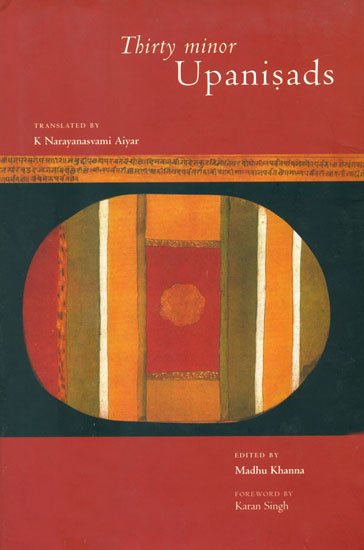Thirty minor Upanishads
by K. Narayanasvami Aiyar | 1914 | 95,228 words
This book contains the English translation of thirty minor Upanishads.—Fourteen belonging to Vedanta, two are categorised as Physiological, three are Mantra, two are Sannyasa and the remaining nine are categorised as Yoga-Upanishads. These Upanishads are properly defined as the Aranya-portion of the Vedas (most ancient Hindu scriptures) and are so-...
Mandala-brahmana Upanishad of Shukla-Yajurveda, Chapter V
"The manas influenced by worldly objects is liable to bondage; and that (manas) which is not so influenced by these is fit for salvation. Hence all the world becomes an object of citta; whereas the same citta when it is supportless and well-ripe in the state of unmanī, becomes worthy of laya (absorption in Brahman). This absorption you should learn from me who am the all-full. I alone am the cause of the absorption of manas. The manas is within the jyotis (spiritual light) which again is latent in the spiritual sound which pertains to the anāhata (heart) sound. That manas which is the agent of creation, preservation, and destruction of the three worlds—that same manas becomes absorbed in that which is the highest seat of Viṣṇu; through such an absorption, one gets the pure and secondless state, owing to the absence of difference then. This alone is the highest truth. He who knows this, will wander in the world like a lad or an idiot or a demon or a simpleton. By practising this amanaska, one is ever contented, his urine and fæces become diminished, his food becomes lessened: he becomes strong in body and his limbs are free from disease and sleep. Then his breath and eyes being motionless, he realises Brahman and attains the nature of bliss.
"That ascetic who is intent on drinking the nectar of Brahman produced by the long practice of this kind of samādhi, becomes a paramahaṃsa (ascetic) or an avadhūta (naked ascetic). By seeing him, all the world becomes pure, and even an illiterate person who serves him is freed from bondage. He (the ascetic) enables the members of his family for one hundred and one generations to cross the ocean of saṃsāra; and his mother, father, wife, and children—all these are similarly freed. Thus is the Upaniṣad. Thus ends the fifth Brāhmaṇa."
